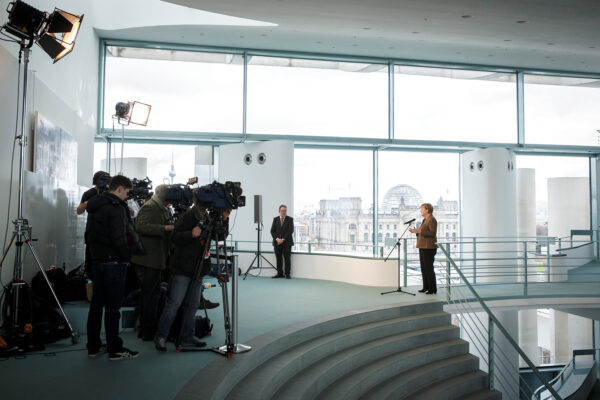
The anti-immigrant Alternative for Germany placed third in municipal elections in Hesse on Sunday in what the mainstream parties fear could be a harbinger for state elections this week.
The far right took 13 percent of the votes in Hesse, pushing the Greens into fourth place.
Chancellor Angela Merkel’s Christian Democrats went down from 34 to 28 percent support. The Social Democrats, who rule in coalition with Merkel’s conservatives nationally, dropped from 31 to 28 percent.
Defections
Both parties in the center are likely to see more defections to the Alternative on Sunday when Baden-Württemberg, Rhineland-Palatinate and Saxony-Anhalt hold regional elections.
Recent polls show the Christian Democrats falling from 39 to around 30 percent support in Baden-Württemberg, the largest of the three states that vote this weekend. The Greens, who govern in the southwest, are seen increasing their support while their Social Democrat coalition partners would tie with the Alternative for third place at around 13 percent.
In the former East German state of Saxony-Anhalt, where unemployment is higher, the anti-immigrant party is at 19 percent support, behind Merkel’s conservatives and the far-left Die Linke but ahead of the Social Democrats.
Bucking the trend is Rhineland-Palatinate, where the two largest parties are neck and neck at 35 percent support, well ahead of the far right at 9 percent.
Migrant crisis
Founded as an anti-euro party in 2013, the Alternative has appealed to a segment of the German right that is dissatisfied with Merkel’s liberal economic and family policies, including phasing out nuclear energy, introducing a national minimum wage and giving gay couples equal rights short of marriage.
Support surged last year when Merkel’s right-wing coalition buckled under the refugee crisis.
More than one million immigrants have applied for asylum in Germany and the influx shows no sign of abating.
Attacks by foreigners in Cologne and other German cities on New Year’s Eve turned public opinion decidedly against the chancellor’s open-door policy.
Hundreds of women and girls were intimidated and robbed that night by groups of men of Arab and North African appearance. Several women said they were raped.
Rupture on the right
Merkel’s coalition has taken measures, from speeding up deportations to freezing family reunifications. But she has personally resisted recommendations from within her own conservative party to cap the number of asylum requests Germany will process, a step neighboring Austria took last month.
Among the supporters for a more restrictive policy are Merkel’s Bavarian allies in the Christian Social Union (CSU).
The reason the more socially conservative CSU exists as a separate party is to ensure that no legitimate competition ever emerges to the right of the Christian Democrats.
To form, party leader and Bavarian prime minister Horst Seehofer has criticized Merkel’s immigration policies in an attempt to take the wind out of the Alternative’s sails. But the chancellor has been slow to make use of the excuse he is giving her to backtrack.
While she dithers, the far right grows.
